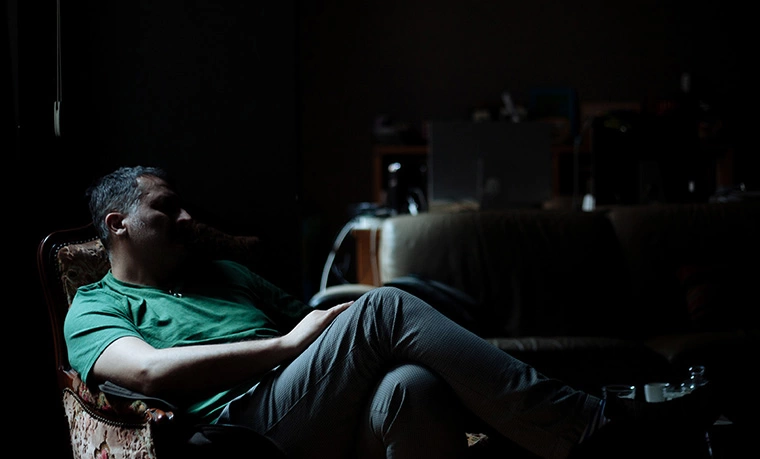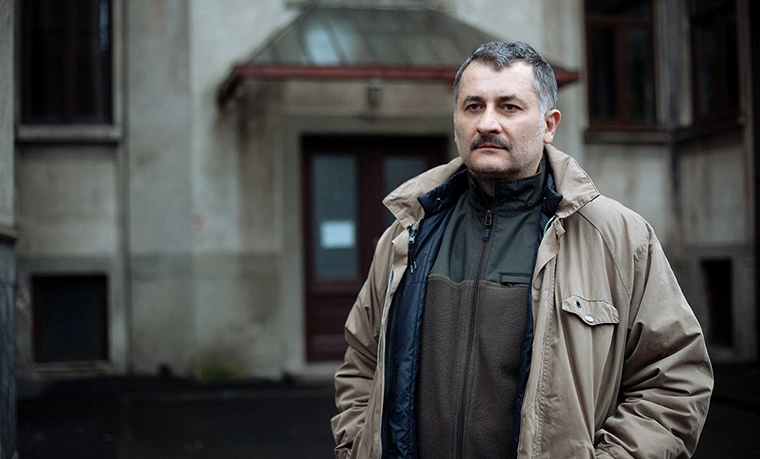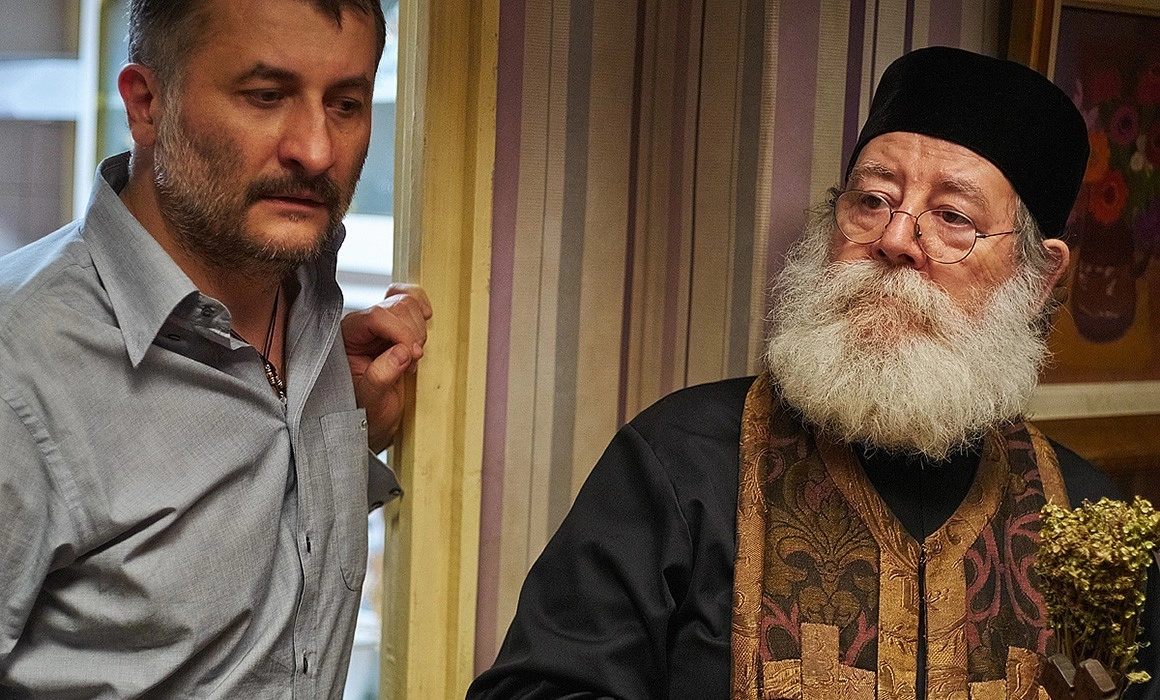The latest movie by Romanian director Cristi Puiu has been selected in the official competition of the Cannes Film Festival. It took the director, who also penned the screenplay of the movie, six years to return to the silver screen with a new feature. In the meantime, his most difficult challenge was to raise the money to produce sieranevada, a film about the 40-day funeral feast of a missing father.
It took me three weeks to get the director of The Death of Mr. Lăzărescu (2005) and Aurora (2010) to give me this interview. He only accepted after about five phone calls and a meet-up at the Byzantine Bookstore, where he played bookstore keeper for a day. And I only got to record it after I woke him up from his sleep on a Saturday morning, reminding him we had scheduled to meet.
That’s how I got to glean never-before discussed details regarding sieranevada. “The screenplay had been completed since 2012, I wrote it because I was determined to tell this story. I started writing sometime in August and wrote it in one month. The director of the Sarajevo Film Festival had gotten in touch with me and told me he wanted to coproduce my next film—if I have anything. The project funding sessions of the national film center in Sarajevo were coming up. I told him I could write something. I started writing it, submitted it, and got the first money from them—not too much, about EUR75,000. The first round of funding came from Bosnia”, Cristi Puiu told me, recounting a few behind-the-scenes financial details on making a Romanian movie.
The director submitted the project to ARTE, but wasn’t accepted. The same thing happened with the national French film agency. “Next up were Croatia and Macedonia, and France was the last on the list. Within about two years’ time. In September 2014, we got the funding that would allow us to start shooting. We later submitted another entry in France for the post-production and got money for that. So we’d be able to finish the movie”, Puiu explained.
The director maintains that the awards he’s received thus far do come in handy when trying to get a film funded, but they don’t matter to such a large extent. “If you’ve gotten some major award, things go smoothly. If you haven’t gotten any awards, but you’ve sold tickets, things also go smoothly. But I was coming on the heels of The Death of Mr. Lăzărescu, which performed very poorly, and Aurora, which performed very poorly. They were both well-received by the critics, but they were very bad business deals. Not to mention they’re lengthy films and no one cares for lengthy films, for business-related reasons. If you make a movie within the 90 to 104-minute standard, which is the average, you can run six screenings per day. If you’ve got a three-hour film, you have to run fewer screenings”, the director added.

And Cristi Puiu’s latest film is also a feature in the true sense of the word. “Whether they care to admit it or not, Western European film producers are interested in working with comfortable directors. Somehow, I’ve ended up with the reputation of being incurable on many counts, including the length of a film. Many have asked me to cut them short and I said no. When I started out with this film, I had a talk with the French co-producer and they told me that Wild Bunch, the international sales agency, had expressed this desire—that the film doesn’t run longer than two hours. I told them it wouldn’t. But before we started shooting, when I saw what the basic edits to the original scripts were and understood what these changes meant in terms of length, I told them I couldn’t make it any shorter than two and a half hours. After we finished the movie, we got to 174 minutes, which is three hours minus six minutes. In fact, the first cut was 200 minutes long. I cut”, Cristi Puiu told scena9.ro
sieranevada tells the story of a family reunited for a 40-day funeral feast. “I’m highly interested in death, in all its forms. That moment when the dead one is gone and all you can see is a memory of them through the cracks, that’s an important moment and it’s a chapter in this story of death. You showed up here when you were born on this planet and at some point you go and something is left behind you. And the things left are somehow also a part of your story. This is possibly the saddest part in our story—in man’s story—the thing we least talk about, the feast. After all, if the story is normal, meaning if the person leaves this life in their old age, by following the natural trajectory, this is often a blessing to the family. If suffering was involved it’s also an act of charity. If they were young, though, it’s no longer charity, it’s a tragedy. I chose my character to be an elderly man, a family man, who may or may not have suffered—I don’t know. My father died in 2007, and the feast right after the funeral, the 40-day feast, and the seven-year feast were all like… It wasn’t the first feast I was taking part in, my grandparents have also died, other people in my life have died, but that was the first time I was overwhelmed by the situation. I really didn’t understand any of it. When it happens to others, you see it with more compassion. When it happens to me, I literally don’t get it. You can somehow close this cycle, of the individual’s itinerary on Earth, when it happens to others. Because your position is that of a sort of spectator. It sucks, it’s sad, but I’m not the one affected by it, I can kind of provide a neutral assessment. But when it happened to me with my father, I really didn’t get it. And it was also very ugly, my dad struggled, he was ill. I had to go to Cannes, I was in the jury of Un certain regard. I thought, “He won’t die while I’m away”, but that’s actually how it happened. There was this movie from Uruguay, I was in the jury, in the theater, I closed my phone. When I came out, I saw nine missed calls from my brother. I said, “That’s it, he’s dead”. It couldn’t have been anything else. I got on a plane, got home. My father’s death somehow happened to me at a distance. Then there was the distance of the whole funeral feast thing. I don’t know how it happens, but there’s a sort bashfulness at play, a sort of respect for the person who’s passed on. You don’t start running their story into the ground. You recount it once or twice, but then move on to your own things. No one’s in the mood—I’m talking about the funeral feast that happens right after the funeral. Then, things are more relaxed at the 40-day thing. Even more so for the 7-year thing”, the director amply recalled how he decided to pick the theme of his Cannes-selected film.

Puiu also recalled a few unusual events that happened during the shoot. “When we shot sieranevada, all sorts of weird things happened. We found this apartment in a high rise in the Sebastian area of Bucharest. But it had been upgraded and that didn’t help. We asked the owners if there were any identical, but non-upgraded apartments in the same building. The rooms were very well divided for what I had in mind. Its surface was 100 square meters (Editor’s note: about 1,076 sq ft)—the biggest socialist-era apartment I’ve ever seen. They told me there’s another one on the second floor, that Mr. Cotescu had died and the apartment was empty. I went to see it the following day, it was the weekend, and they were holding the 40-day funeral feast for their father. Just like the film, which features a 40-day funeral feast. Mr. Cotescu had lived in a non-upgraded four-room apartment, with two cats. Oana Giurgiu, the film’s executive producer, told me she got the feeling she had just walked into Lăzărescu’s apartment. The cats were there and the guy was gone, just like in the Lăzărescu movie. Lots of similarities. Mr. Cotescu was a movie buff, a stamp collector, he collected paintings, lot of books. We hardly brought anything in to set up the apartment. What the production design department did was amazing, they reinvented the apartment, but a lot of the objects featured in the movie belong to Mr. Cotescu. We found two signed picture postcards, one of Jean Constantin and one of Sergiu Nicolaescu. He kept a notebook with all the movies he’d seen. When we drew up the contract, they told us that, had Mr. Cotescu been alive, he would’ve let us film in there for free, he loved movies. We also got paranoid. There was this actress who kept saying: “We’re not alone in here, there are all these noises.” But other things happened, too. On December 20, Sorin Medeleni died. He plays an important part in the movie and never got to see it released. We started production around January 27, which was exactly 40 days after his death. How would I have taken being told all this, one year ago?” Cristi Puiu wondered.




